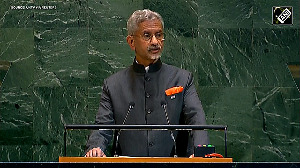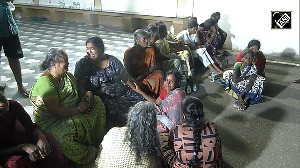Indians move on, no matter what the scale of the calamity.
Nearly 36 hours after gigantic waves swamped the coastal areas of Chennai, life is busy as usual.
Traversing the 23 km from Meenambakkam airport to Marina Beach, looking out of the taxi window, one expects to see chaos; if not chaos then at least an indication that something has gone wickedly wrong in the city. But the only thing wrong, or perhaps right, is that everything is normal.
The city has not come to a standstill. Everybody is back to the grind.
I should have known. Before coming I had called up a friend in Chennai to find out the situation there.
"Oh, there is no problem," Ashok Pal said. "Everything is okay. The problem is only near the beach."
At the prepaid taxi counter at the airport, the man on duty merely raised his eyebrow when I told him I wanted to go to Marina Beach. "It is closed for public," he said while handing me the receipt.
Only the heavy police presence at the beach gives an indication of the turbulence beneath the calm surface.
A few hundred people stand on the edge of the beach, curious to know what the fuss is about. They have been asked not to go in; the administration does not want to take any chances, given that a few more aftershocks are expected.
The litter that one saw on the morning of the disaster has been cleaned up, to the best extent possible, and the bodies -- the ones that the sea has regurgitated -- have been claimed.
The timing of the tragedy was also crucial. Had the killer waves struck in the evening when there are over a lakh of people on the beach, the death toll would have been much higher. The darkness of the night would have prevented them from seeing the gigantic waves and finding refuge would be almost impossible. In chosing the early morning hours to ravage the shore, the water, in a way, was magnanimous in its fury.
The sea itself, after having played havoc for a few minutes, has retreated to its place. For many people, those few minutes were cataclysmic.
To put things in perspective for me, a local resident tells me that the waves even picked up catamarans and deposited them in front of the big, white-coloured office complex of the director general of police, right across the road.
Along the way they knocked off a section of the lighthouse, he adds.
The second part is easily verifiable; there is tangible proof of something having been there before the waves struck. The first, the catamaran part, is not. The reality keeps shifting, depending on whom you ask. The fishermen tend to put the overall toll, the size of the waves and other such details much higher. The police and the administration tend to be a lot more circumspect.
Inspector M Ramesh tells me that not many people died in this section of the coast, and that there is not much to be found here. He adds that there is a hamlet a few kilometres away, just ahead of St Thomas Cathedral, off the road, where nearly 60 fishermen died.
A short ride in an autorickshaw brings me to the place, which is witnessing an exodus.
Most of the people there have taken refuge in a nearby church. The remaining fishermen and their families sit on the pavement with whatever is left of their belongings.
'My sons might be there in burial ground'
Nearby there is a small bus and women inside hand out used clothes to the people. It is a virtual stampede.
A hundred metres or so off the road is where the deserted hamlet, or whatever is left of it, is.
Shankar, 33, one of the few fishermen there, tells me that he came back from the sea at around 6 am on Sunday. "I had gone at around 3 pm on Saturday. A couple of hours after I came home the ground rumbled."
And as if it were a case of double-whammy, he adds ruefully. "Generally I get fish worth around Rs 100 every night. That night I didn't get anything."
He points out to a one-storey building and says that the waves were that high.
Later he lights a candle and takes me to his house -- one of the few in the hamlet to be made of bricks and cement -- to survey the disaster. His 28-year-old wife, his mother and sister were also in when the water raced in. They are all okay, and at Lazarus Church, across the road.
The parish priest at the church, Father A Anthony Swamy, says that around 3,000 people have taken shelter there. "The church is providing them with food, water and toilet facilities."
The priest says the sheer number of people coming in overwhelmed him at first. "The first day we had a lot of problems because we had to arrange for everything," he says. "But today some private agencies and nongovernmental organisations have come forward to help us. We are taking as good care as possible."
The tragedy has brought the people of the area together. "We have all kinds of people here. Hindus, Muslims, Christians. Most of the people are Hindus and Muslims," the Father says.
"Yesterday a Muslim man came to me and asked, 'Father, can I enter the church? Can I stay here?' I told him that we are all God's children. You are welcome to stay here. It is only because of my cassock that you can make out that I am a Christian. I cannot look at you and think that."
Later, nine-year-old Stalin Mohan, who was named after DMK chief M Karunanidhi's son, tells me he was on the beach playing cricket with three of his friends when the sea invaded their playground. "Suddenly we saw this huge wave coming towards us," he says, theatrically.
The plucky boy, with all the ingenuity that only nine year olds can come up with, swam to safety.
His age has insulated him from grief. He is just too proud of his achievement, of his skill and bravery, and does not mind bragging about himself.
Had his grandfather, Mohan, been alive, he, too, would have been proud of him. But the old man, who had gone out to fish, will never know of his grandson's exploits.





